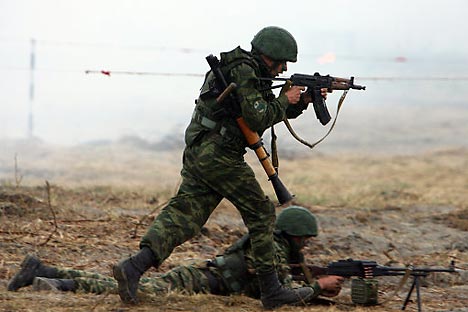Fully professional Russian Army still a long way off

The salary of Russian contract soldiers is almost on a par with that of service personnel in the world's top armies. Source: Igor Zarembo/RIA Novosti
By 2017, the Russian Ministry of Defence plans to increase the number of troops serving under contract in the ranks and the sergeant corps to 425,000. That represents almost two-thirds of the required number of soldiers performing military duty under conscription. The announcement was made at a meeting of the Committee on Defence and Security under the Council of the Federation.
The keynote speaker, Deputy Defence Minister Nikolai Pankov, stated that in the second quarter of this year the Ministry of Defence (MoD) plans to take on at least 18,500 service personnel under contract. “The Q1 targets were fulfilled by 107 percent,” he said.
Meetings of the committee are not public events, so the figures quoted generally reflect the real picture. And the introduction of military contracts for rank-and-file soldiers and sergeants would be a worthy achievement.
The issue of army staffing on a contract basis was first raised in 2004. However, the process was left to meander until 2012. One of the main reasons for this was the very low level of appeal of military service among young people — at least in terms of wages. According to data from the Federal State Statistics Service for that period, the average salary in Russia was almost 18,000 roubles (around US US $570) per month, while the starting salary for contract service personnel was 8000 roubles (around US $254). Moreover, like draftees, contract soldiers were obliged in live in barracks, perform chores and request permission from their commanders to leave the military unit. Generally speaking, the army's recruitment of contract soldiers did not improve the quality of personnel, but only increased the financial outlays, despite the fact that 70 percent of them were immediately dismissed after the first 3-year contract. As a result, the appearance of professionals had no effect on the army's combat capability.
Last year was a turning point. As part of the military reform carried out by Defence Minister Serdyukov, a new salary scheme was introduced on January 1, 2012. As a result, the monetary allowance paid to contract soldiers was increased to 30,000 roubles (around US$ 1000) and taking into account payments for special conditions of service, the figure exceeded 50,000 roubles (around US$ 1586). Hence, the salary of Russian contract soldiers is almost on a par with that of service personnel in the world's top armies. Military service under contract has become competitive in the labour market.
Another major breakthrough was the change in the social status of contract soldiers in the army. Instead of barracks, they were offered places in a navy-style dorm, that is, two-bedroom apartments with all amenities. Married service personnel were allowed to live outside the territory of the unit, and the MoD even decided to bear some of the cost of renting the accommodation.
The rules of service have also been amended. Whereas before contract soldiers did not have the right to leave the unit without the permission of the commanding officer, now they are free to do so at the end of the working day, if no combat drills are scheduled. Contract servicemen have an opportunity to receive higher education, which the MoD considers to be an incentive for career development. The department believes that officer positions should be occupied by people with firsthand experience of military service.
Related:
Russian army to do away with Soviet belt
The outflow of contract soldiers was stemmed by allowing them, as well as officers, to become part of the mortgage system. The catch is that the army will pay the mortgage payments as long as the soldier is still serving. If he decides to break off relations with the MoD, the full burden of the mortgage will fall on his shoulders.
These measures have enabled the MoD to fill nearly all the most technologically complex positions in the air-space defence and strategic missile forces, the navy, and the air force with contract service personnel, as well as units under the command of the Main Intelligence Directorate.
But the priority at the moment is to increase the share of contract service personnel in the ground forces. To that end, 2013-2015 will see the allocation of 51.8 billion roubles (US$ 1.6 billion) to promote military service under contract. Some of the funds are due to go towards improving the recruitment procedure and some towards building new accommodation.
Be that as it may, the new corps of military personnel serving under contract will have no effect on Russia's system of conscription — and not even due to the cost of maintaining a hypothetical professional army. By comparison, the money presently being assigned to promote military service under contract far exceeds the amount requested by the General Staff in 2004 to fully transition the army to a contract basis. The reason is that the MoD continues to focus on the debatable, but highly tenacious idea that in the event of a large-scale military conflict, Russia will require a mobilised reserve. There is only one way to ensure that — keep drafting youngsters.
All rights reserved by Rossiyskaya Gazeta.
Subscribe
to our newsletter!
Get the week's best stories straight to your inbox